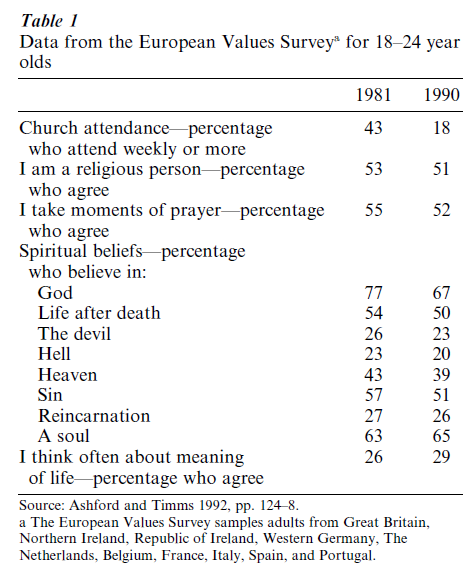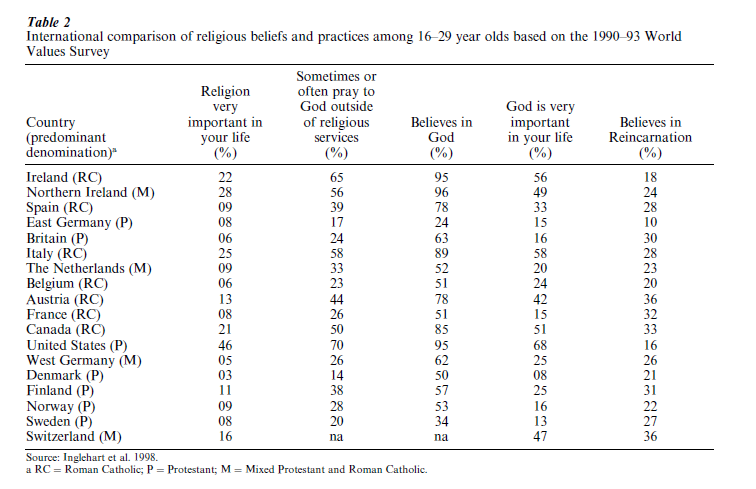View sample Religion And Youth Research Paper. Browse other research paper examples and check the list of research paper topics for more inspiration. If you need a religion research paper written according to all the academic standards, you can always turn to our experienced writers for help. This is how your paper can get an A! Feel free to contact our research paper writing service for professional assistance. We offer high-quality assignments for reasonable rates.
Religion has traditionally been an important aspect of personal and social identity. Socially, it provides a ‘language’—a set of beliefs, values, and practices— which form an ultimate framework of meaning and order, binding people into one community rather than another. Individually, religion locates a person within a social context, conferring a sense of belonging, a way to understand the self in relation to the world, and a purpose to life. Western society is changing rapidly, however, bringing new uncertainties to the social context of identity formation (Giddens 1991). The last 30 years have seen economic restructuring, expansion of educational provision, new developments in communication and information technology, increased social and geographical mobility, changes in personal relationship and family norms, challenges to gender roles, and the generation of new attitudes and accepted ways of being. This raises the question as to what part religion plays in the formation of young people’s identity today?
Academic Writing, Editing, Proofreading, And Problem Solving Services
Get 10% OFF with 24START discount code
1. Who Are The ‘Young People’?
Before considering the relationship between religion and youth identity, it is important to note that the category ‘young people’ and the concept of ‘youth’ are problematic. There is no consensus on an upper age for ‘young people’ and surveys are reported using different age bands for the youngest groups. ‘Youth’ signifies a period of transition between childhood dependency and full adult responsibility but significant transitional markers, such as the school leaving age and access to employment and financial independence, vary between countries. There can also be age dis- parities within societies regarding different types of adult responsibility such as marriage and voting rights. Indeed, ‘youth’ is increasingly being separated from age altogether and becoming a valued personal quality to be retained throughout life. Furthermore, the experience of youth varies greatly according to gender, ethnicity, class, etc. Bearing these conceptual problems in mind, the picture of youth presented here is necessarily a generalized one and the discussion focuses on Christianity which remains the dominant religious tradition in the West (60 percent of Europeans and 76 percent of North Americans claim a Christian identity, Brierley 1997).
2. Young People’s Religious Beliefs And Practices
The data on young people’s religious beliefs and practices are complex and sometimes contradictory. Throughout the industrial West young people are less likely than older people to actively engage with institutional religion (Halman and de Moor 1993, Clark et al. 1995). This may reflect a stage in the life cycle, but the evidence suggests long-term change as well.
Table 1 illustrates declining religiosity among youth in Europe on a number of traditional variables and Table 2 indicates how religiosity varies among young people cross-nationally.

From Tables 1 and 2 it can be seen that while Church association is declining, private prayer and belief in God remains quite high. Belief in the soul and life after death is also apparent. Half of European youth and 79 percent of young people in the United States (Inglehart et al. 1998, Vol. 151) describe themselves as ‘a religious person.’ More locally, there is evidence to suggest that young people take an interest in supernatural phenomenon, nontraditional beliefs, and ‘folk’ religion. Table 2 indicates the extent of belief in reincarnation. In England and Wales approximately one-third of young teenagers believe in their horoscopes, ghosts, and the possibility of contacting the dead (Francis and Kay 1995, p. 152).

It is also important to recognize that while established mainline church membership is declining, there is some growth among smaller nonestablished churches, especially those which adopt an evangelical and charismatic form of spirituality. In this context the nature of belief and practice tends to be more emotive and personal. For example, young people are more likely to think of God as an intimate friend than as a righteous judge or creator. Various non-Christian new religious movements also attract a minority of youth, although these groups have not counteracted the overall drift away from the Church (Bruce 1996, p. 188).
Young people therefore retain a degree of private belief and practice which could offer an ultimate basis for identity formation. However, Table 2 indicates this is not necessarily the case. While many young people believe in God, God and religion are not very important for a large number of them. Gender studies further reveal that religion is less important to men and boys than it is to women and girls. Women in paid employment, however, tend to be more like men in their religiosity, so as more young women expect to have working careers, this gender difference is likely to decrease in favor of the perceived irrelevance of religion. What then is the significance of religion for young people’s identity?
3. Young People’s Religion And Identity
The data suggest three broad patterns of relationship between religion and identity among young people in modern Western society.
3.1 Secular Identity
Some young people reject religion altogether (according to the 1981 European Values Survey, 27 percent of people under 35 claim to be atheists, Harding et al. 1986, p. 48), but a large number have remnants of traditional belief, echos of an early but incomplete socialization into the Christian framework of their culture. These young people tend not to be hostile to Christianity and may even ‘believe’ to some extent, but generally they are ignorant and indifferent to its teachings. Christian plausibility has been undermined by increasing contact with the competing truth claims of other faiths and philosophies, and by the perception that science offers more convincing explanations of life than does religion. Consequently, Christianity has little, if any, significance for these young people’s self-understanding. For the most part, they orient their lives according to a utilitarian rational world view gaining their identity through material consumption and through immediate intimate relationships with family and friends. Links between religion and self-understanding are only salient on special occasions (such as the celebration of a birth or a marriage), or at times of crisis (such as during illness or death) when an implicit Christian identity is unearthed. Even then the significance of religion is fleeting. Its main function is to provide a culturally acceptable background for the renegotiation of an essentially secular identity which is largely achieved through the gathered family and friends. Committed religious belief or understanding is unnecessary in this context.
3.2 Spiritual Identity
Some young people are more active in their approach to religion and identity. They are aware of a wide range of religious symbols from a number of traditions and approach them as a cultural resource which can be subjectively used in a reflexive process of identity formation. Religious symbols provide a means of self-exploration, a source of empowerment and personal growth, around which a sense of self can be constructed. Without recognizing an external authority, these young people are free to decontextualize, reinterpret, and juxtapose apparently contradictory symbols without any sense of conflict. Religious truth and certainty is judged according to subjective experience and utility—if it feels right, or meets an individual’s needs, then it is ‘true.’ This type of religiosity requires little commitment to any particular tradition and the individual can easily move from one set of beliefs and practices to another.
Religion of this type is heavily bound up with the commercial world, especially as presented in New Age philosophies. It generally appeals to older youth in their late twenties rather than to teenagers who cannot afford the more expensive esoteric practices on offer. Where younger age groups do take an interest in these nontraditional forms of religion, it often overlaps with entertainment, is not taken seriously, and competes with other leisure pursuits. As such it does not form an ultimate basis of identity.
3.3 Religious Identity
The remaining young people choose to belong to a particular religious group or church and find their identity within a community of believers. This may be accomplished through a conversion experience to a new religious tradition, or it may be a reaffirmation of the religious tradition of childhood (sometimes this is conflated with broader issues of ethnic identity by way of ‘cultural transition’ or ‘cultural defence’, see Bruce 1996). Either way, the emphasis is on a conscious, autonomous decision to be a part of the group. Consequently, religious identity tends to be strong and salient.
In this respect, the churches which attract young people are often evangelical and charismatic, and are well suited to fostering religious identity. The conservative theology, strong social networks, and high degree of commitment these churches usually require encourages a dominant sense of group belonging around religious themes. A charismatic orientation to the group adds a further dimension in terms of religious experience which helps to authenticate the young person’s beliefs, and allows for self-expression and a sense of intimacy with God and other believers. In this context a strong sense of religious identity is established.
4. Summary
In conclusion, over the last 30 years established institutional Christianity has generally become less influential in the formation of young people’s identity. However, the rate of Church decline is beginning to slow down and religious ideas have not disappeared from society. Consequently, Christianity, independently or as part of a heterodox collection of beliefs and practices, does continue to inform youth identity to a certain extent. It remains to be seen whether the latter two patterns will overturn the general trend towards a secular identity among Western youth in the future.
Bibliography:
- Ashford S, Timms N 1992 What Europe Thinks: A Study of Western European Values. Dartmouth Ltd, Aldershot, UK
- Brierley P 1997 UK Christian Handbook Religious Trends No. 1, 1998/99 edn. Christian Research, London
- Bruce S 1996 Religion in the Modern World: From Cathedral to Cults. Oxford University Press, Oxford, UK
- Clark W, Carroll J W, Roozen D A (eds.) 1995 The Post-War Generation & Establishment Religion: Cross-Cultural Perspectives. Westview Press, Boulder, CO
- Davie G 1998 God and Caesar: religion in a rapidly changing Europe. In: Bailey J (ed.) Social Europe, 2nd edn. Longman, London, pp. 231–53
- Francis L J, Kay W K 1995 Teenage Religion and Values. Gracewing, Leominster, UK
- Giddens A 1991 Modernity and Self-Identity. Polity Press, Cambridge, UK
- Halman L, de Moor R 1993 Religion, churches and moral values. In: Ester P, Halman L, de Moor R (eds.) The Individualizing Society: Value Change in Europe and North America. Tilburg University Press, Tilburg, The Netherlands pp. 37–66
- Harding S, Phillips D, Fogarty M 1986 Contrasting Values in Western Europe: Unity, Diversity and Change. Macmillan Press, Basingstoke, UK
- Inglehart R, Basanex M, Moreno A 1998 Human Values and Beliefs: A Cross-Cultural Sourcebook. University of Michigan Press, Ann Arbor, MI




